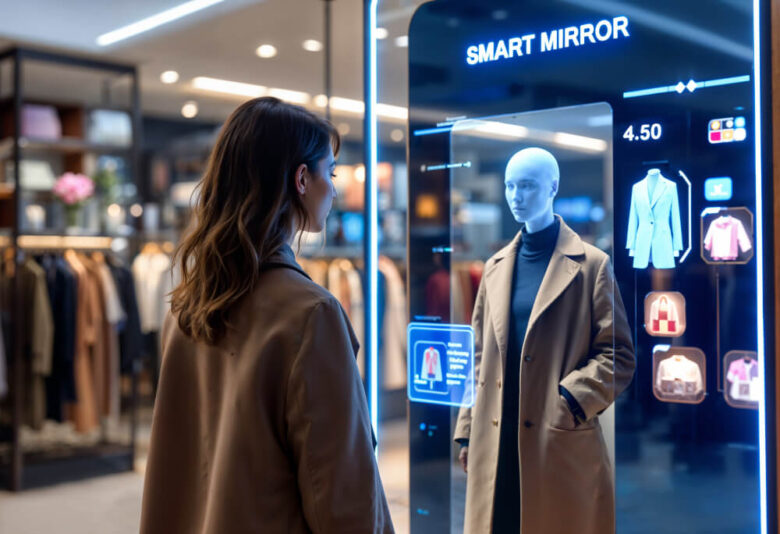Artificial intelligence has quickly become a part of our daily life, transforming various industries and fundamentally changing the way people interact with technologies. One of the most exciting applications of AI is that of shopping robots. These sophisticated tools are changing the way consumers search for how to compare, buy, and purchase items, combining convenience with personalization, resulting in the most modern shopping experience. This blog focuses on the intriguing realm of AI personal shopping assistants, their advantages as well as the challenges they pose, and the potential for the future for this cutting-edge technology.
How AI Personal Shopping Assistants Work
The core premise of AI personal assistants for shopping is the capability to adapt and learn personal preferences by using advanced algorithms and machine learning. Typically, these assistants look at the past purchase behavior as well as browsing history and data provided by users to comprehend preferences and suggest items. Through integrating with online shopping platforms and making use of massive databases and data, they are able to provide users with personalized recommendations that are in line with their budgets and tastes. Certain AI systems even allow conversations with customers and make the experience feel natural and personalized. The bottom line is that AI personalized shopping assistants resemble the expertise of a salesperson; however, they can be operated seamlessly by websites, apps, and virtual assistants such as Alexa and Google Assistant.
Benefits of Using AI Personal Shopping Assistants
AI personalized shopping assistants can provide numerous advantages that improve the shopping experience. They first save time. These tools simplify decision-making processes by narrowing the choices of products to the ones that are most pertinent to thcustomer. . Their ability to evaluate prices, spot discounts, and organize customized options eliminates the need to do lengthy manual study. Additionally, they promote access and ease of use through their availability at any time and from anywhere. If you’re at home, on your commute, or on your way to work, an AI shopping assistant can help you towards the ideal purchase. In addition, these apps are able to meet the needs of specific niches like sustainable shopping or specific diet preferences, which are in line with the individual’s values. While increasing customer satisfaction through personalization, AI shopping assistants also help shoppers make better choices by offering in-depth information and comparisons of products.
Examples of AI Personal Shopping Assistants in Use
The use of AI personal shopping assistants is rising across different industries, demonstrating their flexibility and effectiveness. Companies such as Amazon as well as eBay have implemented AI in their platforms to give personalized recommendations and enhance the shopping experience online. Virtual wardrobe assistants like Stitch Fix employ algorithms to create clothes suggestions based on users’ preferences and combine AI alongside human stylists. In the same way, Sephora Virtual Artist leverages the technology of augmented reality (AR) along with AI to aid customers in testing and selecting products on the internet. Brands such as H&M as well as North Face have also embraced chatbots powered by AI that aid customers in finding the perfecproducts. . From food to travel reservations, AI shopping assistants are creating innovative solutions that cater to a variety of consumer wants.
Challenges and Considerations
Despite their incredible capability, AI personal shopping assistants have a number of issues and concerns that must be addressed. Privacy of data is one of the biggest issues. AI systems rely on user data in order to provide an experience that is personalized; however, protecting this data is crucial to maintaining the trust of users. Furthermore, even though AI excels in recognizing trends and patterns, its recommendations might not always reflect the subtleties of human tastes, especially for items such as fashion or art. Accessibility is another problem, since the majority of consumers aren’t knowledgeable about and don’t have access to the most recent technology. Additionally, ethical issues arise when AI systems favor profit-driven partnerships over impartial suggestions, potentially restricting the choice of users and reducing the ability to be transparent. The solution to these issues is crucial for ensuring widespread acceptance and the success of AI personalized shopping assistants in the field.
The Future of AI Personal Shopping Assistants
In the future, AI personal shopping assistants are likely to be more thrilling as technology improves. With advances in machine learning as well as natural language processing, these assistants will be more conversational and intuitive, closely mimicking human-like interaction. Integration with virtual reality and augmented reality could be another option that allows customers to experience the product before purchasing. In addition, as data encryption and privacy protocols are improved, the security concerns and privacy are likely to be lowered. Blockchain technology integration can also improve the transparency of transactions and improve trust between users. AI personalized shopping assistance can be able to cater to new trends in retail, including localization, sustainability, and ethical shopping, in order to provide shoppers highly personal and ethical choices. The potential for advancement in this area is endless, which makes AI an integral part of the next shopping experience.
FAQs
1. What is AI, your personal assistant for shopping?
AI personal shopping assistants (PSAs) are smart tools or systems that utilize artificial intelligence to recommend items as well as provide information and make shopping easier for customers.
2. How do I make use of the AI shopping assistant?
You can make use of AI shopping assistants via mobile applications, e-commerce platforms, or virtual assistants such as Amazon Alexa or Google Assistant. These programs typically require simple inputs at first, but they will develop your preferences as time passes.
3. Are AI private shopping assistants protected?
Security that comes with AI personal assistants for shopping is dependent on the platform as well as the manner in which data is handled. Most trusted platforms employ strong encryption and privacy protections to safeguard user information.
4. Could AI shopping assistants replace salespeople?
Although AI personal shopping assistants provide an incredible convenience, they will not replace human companions completely, in particular for extremely nuanced or relationship-driven shopping experiences.
5. What industries make use of AI personal shopping assistants?
AI personal shopping assistants (PSAs) are used extensively in the fields of fashion and beauty, travel, grocery shopping, and online commerce, in which personalization and customer engagement are crucial.




